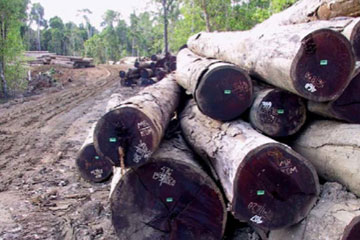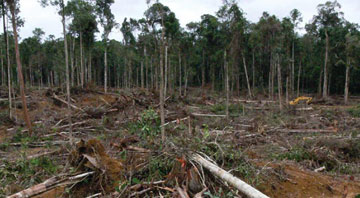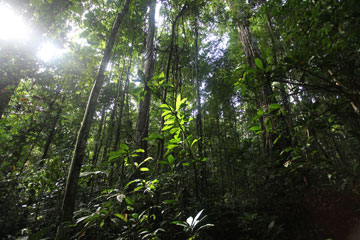Timber barons are illegally exploiting Indonesia’s increasingly threatened lowland rainforests on the island of New Guinea for merbau wood, found an undercover investigation conducted by the Environmental Investigation Agency (EIA) and its Indonesian partner Telapak.
The sting, launched after Indonesian customs officers discovered 23 containers of merbau logs during a routine inspection in October 2009 at Jakarta’s Tanjung Priok port, found organizers used bribery to acquire false documents to circumvent Indonesia’s ban on log exports. The report names businessmen Ricky Gunawan and Hengky Gosal as ringleaders in the operation, which aimed to smuggle the rainforest timber into China and Singapore.
 Illegal merbau logs in Seremuk, South Sorong, West Papua, 2003. Image and caption ©EIA/Telepak. Merbau is a valuable dark hardwood used to make flooring, decking, outdoor furniture, doors and window frames, according to Rogue Traders. It is typically exported to Asian countries, notably China, India, Singapore, and South Korea, but also ends up in products sold in Australia, Europe and the U.S. More than a quarter of Indonesia’s official wood exports consist of merbau EIA and Telepak note that the Indonesian Ministry of Forestry began preparations to list merbau on Appendix III of the Convention on International Trade in Endangered Species (CITES) in 2005, but failed to carry out the listing. |
The report, titled Rogue Traders: The Murky Business of Merbau Timber Smuggling in Indonesia, comes on the heels of a Chatham House study that found a sharp decline in illegal logging in Indonesia in recent years. The EIA/Telapak says its findings provide an opportunity for the Indonesian government to enforce its environmental laws through prosecution.
“While the huge quantities of illegal timber flowing from Indonesia during the first half of the decade has declined, effective law enforcement against those responsible – the financiers, company bosses and corrupt officials – has been woefully inadequate,” Julian Newman of EIA said in a statement.
“It is no wonder the Indonesian President has ordered the country’s judicial mafia eradication taskforce to scrutinise illegal logging cases. It should certainly focus its attention on two merbau smugglers named in this report – Ricky Gunawan and Hengky Gosal.”
 Illegal logging, West Papua, April 2009. 25 percent of Papua’s forests have been lost since the late 1990s, according to Rogue Traders. Image ©EIA/Telepak. |
The report notes Gosal may be continuing to ship 450 metric tons of illegally logged merbau per month to China. It says that while EIA and Telapak have submitted several reports detailing Gunawan’s activities to Indonesian authorities, he has yet to be investigated and may also continue to ship illegal merbau to southern China.
“The illegal logging and trade of merbau in Indonesia is symptomatic of wider governance and enforcement failures in the country’s notoriously opaque and corrupt forestry sector as a whole. The need for more effective control systems is clear if the battle against illegal logging is to progress.”
EIA and Telapak urge the Indonesian government to prosecute the traders and move to staunch the illegal merbau trade by listing it under the UN Convention on International Trade in Endangered Species (CITES). A 2005 investigation by EIA/Telapak found that some 300,000 cubic meters of merbau logs were being smuggled out of Papua every month. Shortly after the report was released, authorities conducted raids, seizing illicit timber and identifying nearly 200 suspects.
 Lowland rainforest in West Papua. Photo taken by Rhett A. Butler in August 2010. |
The Indonesian half of the islands of New Guinea—consisting of the provinces of Papua and West Papua and formerly known as Irian Jaya—is home to the bulk of Indonesia’s remaining lowland rainforests and more than half the country’s biodiversity. But the region is increasingly seen as a source of timber and land for industrial commodity production. Millions of hectares of forest have been concessioned for logging and conversion for oil palm plantations.
CITATION: Rogue Traders: The Murky Business of Merbau Timber Smuggling in Indonesia. EIA/Telapak, August 2010